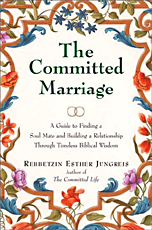"A Roman matron once asked a sage, 'How many days did it take G-d to create the world?' 'Six,' he answered. 'And since then, what has he been doing?' The sage replied. 'Making matches.' " Rebbetzin Esther Jungreis knows this Genesis midrash since she is descended from a great rabbinic dynasty that traces its lineage to King David. She is a matchmaker and founder and president of Hineni, an outreach organization which connects Jews with their heritage. Jungreis also writes a weekly column for the Jewish Press and lectures extensively all over the world.
The author has designed this book as a guide to finding a soul mate, strengthening a relationship, healing past hurts, and building a life together on the foundation of faith and the precepts of the Bible. Her own marriage of more than 40 years is a prime example of a relationship based on spiritual respect, listening, sharing, and transformation.
In Jewish tradition, forty days before our creation, G-d selects a mate for us. One of the challenges of life is to be patient enough to wait for this soul mate to connect with us. When one young woman talks about what she looks for in a prospective partner, she mentions good looks, great personality, money, brains, athletic, fun, and successful. Rebbetzin Jungreis says there is only one criteria for a soul mate — a good heart. Other themes covered here are developing a good eye, finding and being a good friend, being a good neighbor, and projecting the future by anticipating the consequences of one's actions.
The author's constant emphasis of the importance of developing and improving one's character traits is one of the major strengths in this robust spiritual examination of marriage. This relationship is an ideal workshop for enriching and expanding attention, patience, tenderness, affection, forgiveness, and much more. For example, Rebbetzin Jungreis suggests putting a sign in homes: "Life and death are in the tongue." She uses an illustration of this from her birth family. "If my siblings or I didn't behave, my father would admonish us by saying, 'My precious lights, this type of conduct is not appropriate for you.' And immediately, his words would put us back on track. When my father referred to us as precious lights, he wasn't just calling us by endearing names. Rather, he was reminding us of our higher mission."
Taking in the wisdom contained on these pages, we realize that marriage is a perfect venue for working out the purpose of our lives. "The Yiddish word shteig is difficult to translate, but it most aptly describes the purpose of life. To shteig means to be in a constant state of growth and development." That nicely sums it all up.
